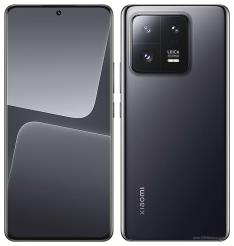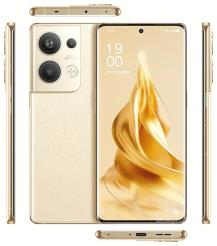Xiaomi 13 Pro
 |
VS |
Oppo Reno9 Pro+
 |
|
December 14, 2022
|
Released: |
December 02, 2022 |
|
Android 13, MIUI 14
|
Operating System: |
Android 13, ColorOS 13 |
|
Ceramic White, Ceramic Black, Ceramic Flora Green, Mountain Blue
|
Colors: |
Black, Gold, Mint |
|
|
Models: |
PGW110 |
|
5G, 4G, 3G, 2G
|
Network Speed: |
5G, 4G, 3G, 2G |
| Display |
|
6.73 inches, 108.9 cm2 (89.6% screen-to-body ratio)
|
Size: |
6.7 inches, 108.0 cm2 (90.9% screen-to-body ratio) |
|
1440 x 3200 pixels, 20:9 ratio (522 ppi density)
|
Resolution: |
1080 x 2412 pixels, 20:9 ratio (394 ppi density) |
|
LTPO OLED, 1B colors, 120Hz, Dolby Vision, HDR10+, 1200 nits (HBM), 1900 nits (peak)
|
Type: |
AMOLED, 1B colors, 120Hz, HDR10+, 500 nits (typ), 800 nits (HBM), 950 nits (peak) |
|
Corning Gorilla Glass Victus
|
Protection: |
Asahi Glass AGC DT-Star2 |
| Body |
|
162.9
mm (6.41 in) |
Height: |
161.5 mm (6.36 in) |
|
74.6
mm (2.94 in) |
Width: |
73.6 mm (2.90 in) |
|
8.4
mm (0.33 in) |
Thickness: |
8 mm (0.31 in) |
|
210 g |
Weight: |
192 g |
|
IPx8
|
Water Resistant: |
No |
|
Glass front (Gorilla Glass Victus), ceramic back or silicone polymer back, aluminum frame
|
Material: |
Glass front (Asahi Glass), aluminum frame |
|
Dual SIM (Nano-SIM, dual stand-by)
|
SIM: |
Dual SIM (Nano-SIM, dual stand-by) |
| Rear Camera |
|
3
|
Number of Cameras: |
3 |
|
50.3 MP, f/1.9, 23 mm (wide), 1.0″-type, 1.6µm, Dual Pixel PDAF, Laser AF, OIS
50 MP, f/2.0, 75 mm (telephoto), PDAF (10cm - ∞), 3.2x optical zoom
50 MP, f/2.2, 14 mm, 115˚ (ultrawide), AF
|
Camera Resolutions: |
50 MP, f/1.8, 24 mm (wide), 1/1.56″, 1.0µm, multi-directional PDAF, OIS
8 MP, f/2.2, 120˚ (ultrawide), 1/4.0″, 1.12µm
2 MP, f/2.4, (depth) |
|
8K@24fps (HDR), 4K@24/30/60fps (HDR10+, 10-bit Dolby Vision HDR, 10-bit LOG), 1080p@30/120/240/960fps, 1080p@1920fps, gyro-EIS
|
Video Resolution: |
4K@30/60fps, 1080p@30/60/120/240fps, gyro-EIS, OIS, HDR |
|
Leica lens, Dual-LED dual-tone flash, HDR, panorama
|
Features: |
LED flash, HDR, panorama |
| Front (Selfie) Camera |
|
32 MP, (wide)
|
Camera Resolutions: |
32 MP, f/2.4, 22 mm (wide), 1/2.74″, 0.8µm, AF |
|
1080p@30fps
|
Video Resolution: |
1080p@30fps, gyro-EIS |
|
HDR, panorama
|
Features: |
Panorama, HDR |
| Battery |
|
Li-Po 4820 mAh, non-removable
|
Battery Capacity: |
Li-Po 4700 mAh, non-removable |
|
120W wired, PD3.0, QC4, 100% in 19 min (advertised)
50W wireless, 100% in 36 min (advertised)
10W reverse wireless
|
Charging: |
80W wired, PD, QC3, 45% in 1-10 min, 1-100% in 31 min (advertised)
Reverse wired |
| Hardware |
|
Qualcomm SM8550 Snapdragon 8 Gen 2 (4 nm)
|
Chipset: |
Qualcomm SM8475 Snapdragon 8+ Gen 1 (4 nm) |
|
Octa-core (1x3.2 GHz Cortex-X3 & 2x2.8 GHz Cortex-A715 & 2x2.8 GHz Cortex-A710 & 3x2.0 GHz Cortex-A510)
|
Processor: |
Octa-core (1x3.0 GHz Cortex-X2 & 3x2.75 GHz Cortex-A710 & 4x2.0 GHz Cortex-A510) |
|
Adreno 740
|
GPU: |
Adreno 730 |
|
128GB 8GB RAM, 256GB 8GB RAM, 256GB 12GB RAM, 512GB 12GB RAM
|
Memory: |
256GB 16GB RAM, 512GB 16GB RAM |
|
No
|
Memory Card Slot: |
No |
|
Fingerprint (under display, optical), accelerometer, proximity, gyro, compass, barometer, color spectrum
|
Sensors: |
Fingerprint (under display, optical), accelerometer, gyro, proximity, compass, color spectrum |
|
No
|
Radio: |
No |
|
No
|
Audio Jack 3.5 mm: |
No |
| Network & Connectivity |
|
Wi-Fi 802.11 a/b/g/n/ac/6e, dual-band, Wi-Fi Direct
|
Wi-Fi: |
Wi-Fi 802.11 a/b/g/n/ac/6, dual-band, Wi-Fi Direct |
|
5.3, A2DP, LE
|
Bluetooth: |
5.2, A2DP, LE, aptX HD |
|
USB Type-C 2.0, OTG
|
USB: |
USB Type-C 2.0, OTG |
|
GPS (L1+L5), GLONASS (G1), BDS (B1I+B1c+B2a), GALILEO (E1+E5a), QZSS (L1+L5), NavIC (L5)
|
GPS: |
GPS (L1+L5), GLONASS (L1), BDS (B1I+B2a+Bc), GALILEO (E1+E5a), QZSS (L1+L5) |
|
Yes
|
NFC: |
Yes, eSE, HCE, UICC, NFC-SIM |
|
5G / LTE / CDMA2000 / HSPA / CDMA / GSM
|
Technology: |
5G / LTE / CDMA2000 / HSPA / CDMA / GSM |